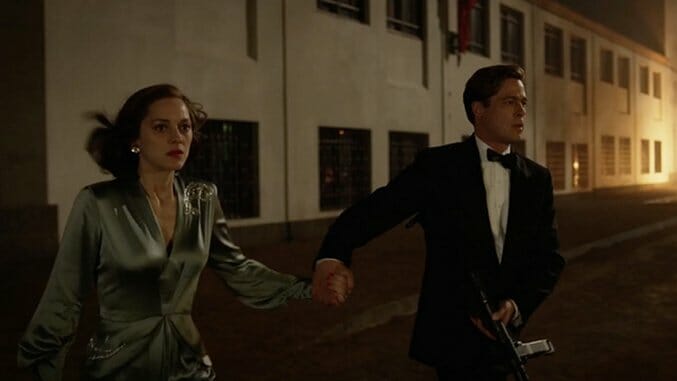Allied

Opening your World War II movie in Casablanca is like opening your horror movie with the exorcism of a vulgar little youngling—you better be bringing something new to this situation or be certain you’re executing at a level that can hang with your esteemed predecessors. Allied, Robert Zemeckis’s retro wartime mystery, does both: Spycraft, organized around an opening mission for Canadian spy Max (Brad Pitt) and displaced French Resistance fighter Marianne (Marion Cotillard) to knock off the German ambassador at a party, allows romance to bleed into the events with an elegance even James Bond films could never dream of attaining. Max and Marianne pose as husband and wife, playing Casablancan society as well as the local Nazi regime while perfecting their plot.
The movie juggles their burgeoning relationship and their professional duties nimbly, building both to a head (including a spectacularly set sex scene, which you’re definitely not getting in Casablanca) the day of the assassination. While most modern World War II movies traffic in the brutal horrors of war, Allied focuses on an intelligence officer’s regret and betrayal without pulling any emotional punches: The look in a Casablancan friend’s eyes is just as memorable as the bloodshed in Saving Private Ryan. Inevitably, the spies deliver on their planned execution, shatter a roomful of lives and begin to build their own together.
As the wedded pair raise a child in London, accusations come from the bowels of the British intelligence community (the more subterranean your office, the higher your pay grade, according to the cinematic language of spy films) that the real Marianne was killed long before the Casablanca mission, back in France with the rest of her Resistance unit, and Max has been living with an impostor who also happens to be a German spy. In turn, Max must leave a piece of juicy (fake) information from HQ around the house—setting a trap for his wife—to see if it turns up on German communication channels after the weekend. If it does, suspicions are confirmed, and Max will be obliged to kill his wife with his own hands to prove his loyalty to the Allies.
Back in Casablanca, Max was astonished by how quickly and loyally Marianne attracted Nazi friendships. She explained then, “I keep the emotions real, that’s why it works.” As such, Zemeckis establishes the idea of betrayal from the film’s opening, and the growth of that sensation over the course of the film is suffocating. The doubt and misdirection that the other spycraft-as-Pitt-marriage-allegory, Mr. and Mrs. Smith, played for sexy laughs clog the air in Allied—we’re tense as the marriage brawls in the mind rather than in a domestic gunfight. We don’t question their sex lives; Zemeckis instead has us question our own relationships, filled with their particular minor lies and petty subterfuges.